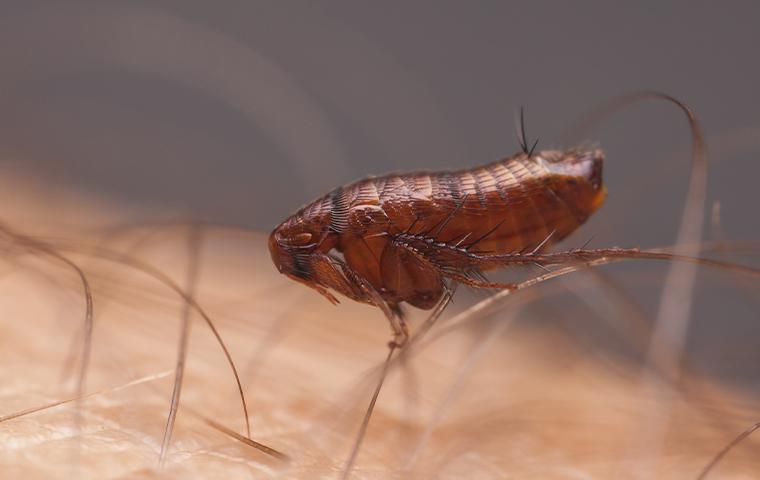Flea & Tick Identification & Prevention
(Siphonaptera | Ixodida)
What Are Fleas and Ticks?
Fleas and ticks are ectoparasites (organisms that live on the skin surface of a host that they feed on), and they are common pests that thrive throughout the spring, summer, and fall seasons in New Jersey. Blood is the sole source of food for fleas and ticks and allows them to complete their life cycle.

Adult fleas typically feed on one host throughout their lives, while ticks have a much longer lifespan and require blood meals from several different hosts. Fleas are a type of wingless insect that doesn’t fly but does jump using their powerful back legs. Ticks are arachnids and cannot fly or jump.
Both fleas and ticks invade yards and outdoor spaces where they relentlessly feed on warm-blooded animal blood to meet their nutritional needs. Some of their favorite hosts include deer, raccoons, skunks, squirrels, rats, livestock, mice, dogs, and cats. While people are not preferred hosts, both fleas and ticks will bite us and feed on our blood if we are available.
Are Fleas and Ticks Dangerous?
There are health risks associated with fleas and ticks, making them dangerous and unwelcome pests in our yards and homes.
Problems that fleas cause include allergic reactions, allergic dermatitis, secondary infections, and the spread of parasitic tapeworm. While the spread of diseases by fleas is not a huge concern (in the U.S.), they do spread murine typhus and the plague.
Ticks are responsible for spreading diseases that can make both people and animals ill. Through their saliva, ticks can spread Lyme disease, Rocky Mountain spotted fever, and tularemia.
Why Do I Have a Flea and Tick Problem?
Fleas and ticks move to different locations on the backs of their animal hosts. When mice, squirrels, deer, raccoons, or your neighbor’s dogs or cats move around your yard, they can leave behind fleas and ticks. When you, your kids, or your pets come into contact with the fleas and ticks, you will unintentionally introduce them into your home. These parasites can also get inside on the back of a rodent or wild animal intruder.
Fleas can also end up in your house by coming in on a piece of upholstered furniture or a rug already infested with flea eggs or larvae. In multi-unit buildings, they move from unit to unit through cracks in walls or spaces under doors or around baseboards. Fleas tend to be more problematic inside structures because they can complete their life cycle indoors, whereas most ticks cannot.
Where Will I Find Fleas and Ticks?
Outside, fleas and ticks live in damp areas of dense vegetation waiting for a host to happen by that they can crawl or jump onto. Some outdoor locations where people often run into these pests include fields, meadows, parks, athletic fields, and wooded areas.
In our yards, areas that fleas and ticks hide include:
- Under decks and porches
- Under piles of leaves and other organic debris
- Within tall grass and weeds
- Under mulch
- In areas of overgrown vegetation
If fleas are not feeding on a host inside our home, you’ll likely find them hiding in rugs, upholstered furniture, behind baseboards, or in bedding.
How Do I Get Rid Of Fleas and Ticks?
Don’t let fleas and ticks ruin your ability to enjoy your yard or feel comfortable in your home. Partner with the professionals at Alliance Pest Services to control biting fleas and ticks. We will provide the fast action and effective solutions you are looking for.
At Alliance Pest Services, our focus is on meeting each customer’s unique pest control needs. We understand there is no one-size-fits-all solution to pest problems. Our professionals will take the time to get to know you, your home, and your pest control needs. Our flea and tick control services will protect your family from unwelcome fleas and ticks. If you live in the Monmouth County, New Jersey area, and would like to learn more about our residential or commercial pest control options, give us a call today!
How Can I Prevent Fleas and Ticks In The Future?
In addition to our home pest control and commercial pest control services, protect your property from pests with the following prevention tips:
- Mow your lawn regularly and maintain your landscape to reduce the amount of vegetation where fleas and ticks can hide.
- Cut back tall grass and weeds from the foundation of your home, fence lines, and play structures.
- After you or your kids spend time outside in grassy or wooded areas, inspect for fleas and ticks before going back indoors.
- Seal areas off areas under decks or porches to remove a common gathering spot for fleas and ticks.
- Regularly vacuum to remove stray fleas and ticks that have found a way into your home.
- If you own pets, make sure they are on a regular flea and tick preventative program to help stop them from introducing fleas and ticks into your home.
- Regularly wash pet bedding.
Latest Blogs
Stay informed about pests and pest related issues in your area!
Dangerous Spiders Of Columbia, MD
If three different spiders are placed in front of you and you are told to pick up the harmless one to win a million dollars, would you feel confident enough to do it?
The Easiest Way To Get Bats Off Your Monmouth County Property
Do you see an increased amount of bats around your home lately? Learn the best way to get bats off of your property.
Are The Fleas In Monmouth County Causing You Headaches?
Prevent and treat fleas with help from Alliance Pest Services in Monmouth County.
Request Your Free Quote
"*" indicates required fields


